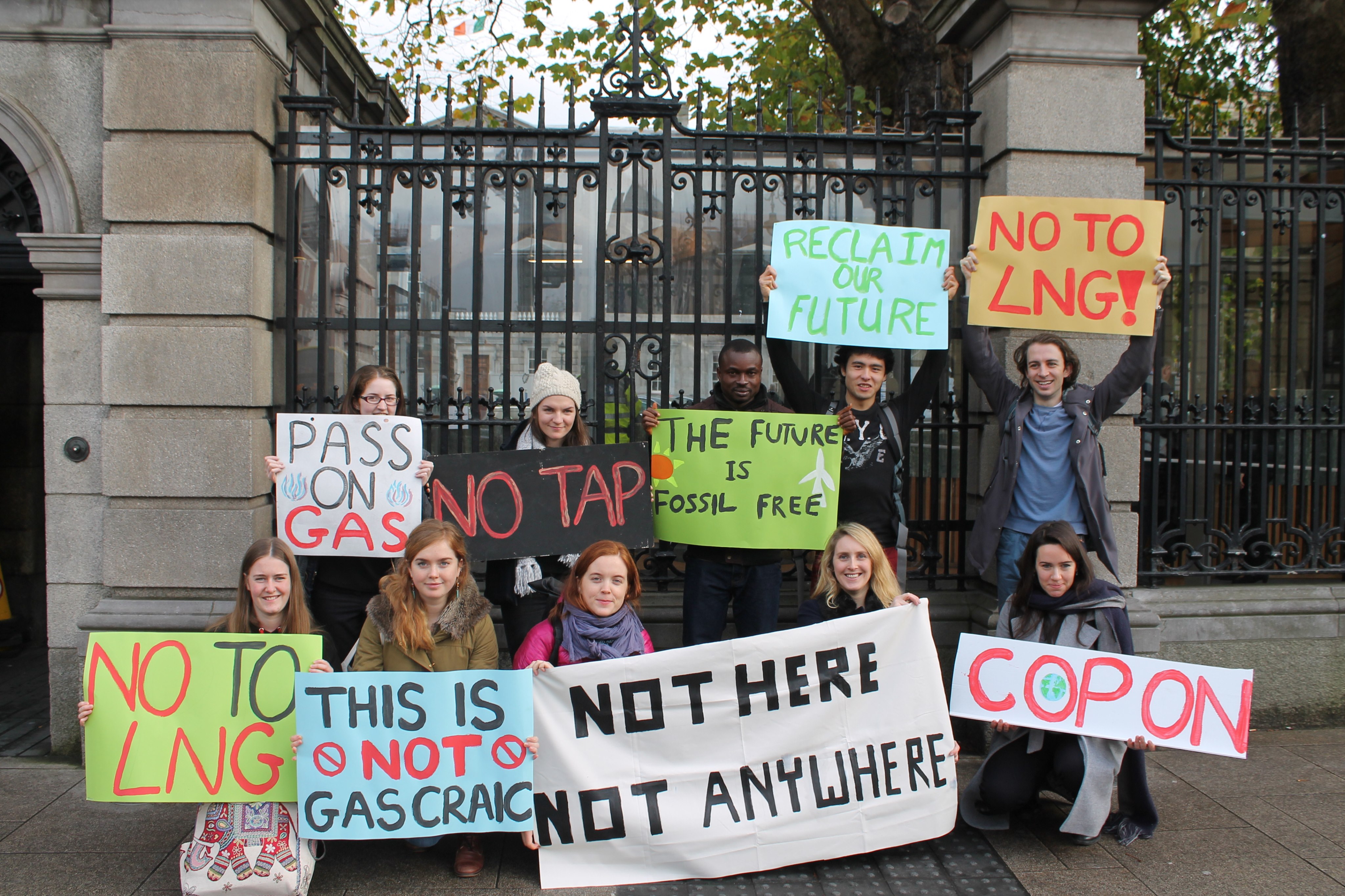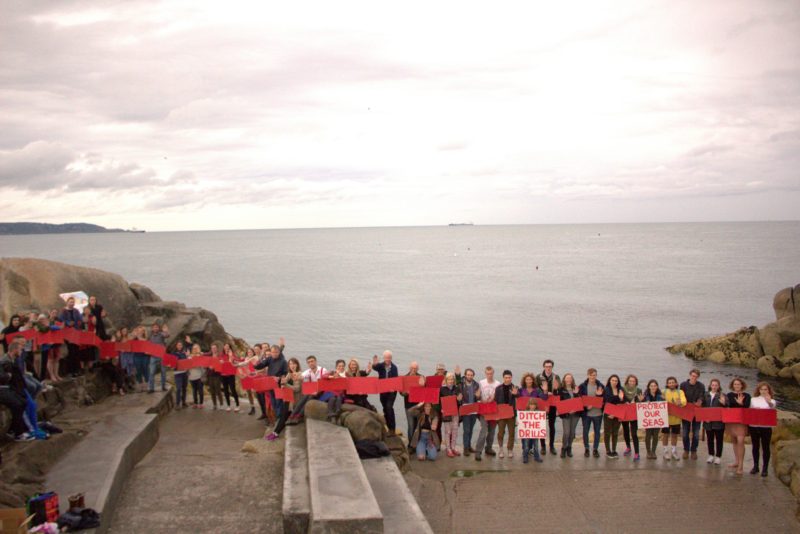When it comes to the climate crisis, each new headline seems to herald further bad news. So it’s easy to wonder sometimes if there’s anything at all that can be done. Even as passionate young activists across the globe take to the streets with the message that climate change is both real and urgent, their nations’ leaders continue to deny the issue and to prioritise other matters.
However, this gulf between political and economic interests and the priorities of the masses of people now vocalising their discontent with the inaction of those in power has given rise to organisations that are valiantly taking the fight to those who threaten to push the planet further and further towards the precipice.
One grassroots organisation calling for widespread change is Not Here, Not Anywhere, a nonpartisan movement advocating for Ireland to end its dependence on fossil fuels and implement a “just transition to renewable energy systems”, and for other countries to do the same.
Established in 2017 following Ireland’s fracking ban, Not Here, Not Anywhere says an important part of its campaign is to raise awareness of the negative ecological role being played by the global fossil fuel industry, which its members describe as unjust. They seek to highlight the damage being done to the environment by Ireland due to its outsourcing of the dirty energy it produces.
According to Tony Jeffrey, one of the organisation’s members, Ireland is symbolic of the fossil fuel industry and were it to transition to renewable energy systems, it would serve as a “massive statement” that could easily bring on a broader paradigm shift in energy creation for other nations to follow. “Renewable energy is cheaper”, he tells me, citing solar and wind power as key examples.
I was recently at a panel where someone said something that really stuck with me: If you don’t do politics, politics will do you. I think that definitely applies to the planet
Jeffrey adds that the Irish sea is almost 10 times larger than the country’s landmass, making it a tempting target for the fossil fuel industry. With this in mind, Not Here, Not Anywhere is advocating for an immediate ban on all current offshore drilling licenses issued to the fossil fuel industry. As the organisation stresses, 80 per cent of fossil fuel reserves need to be kept in the ground in order for the planet to maintain a temperature below 1.5 degrees Celsius.
What would this fossil fuel-free future look like for Ireland? Not Here, Not Anywhere has laid out a 10-step guide outlining exactly what it believes Ireland must do. These steps include transitioning to renewable energy systems, protecting our seas from offshore drilling and supporting a ban on fracking in Northern Ireland.
The guide also focuses on infrastructure, emphasising the importance of banning fracked gas importation through Liquefied Natural Gas import terminals. The threat of the greenhouse gas footprint posed by fracked gas is almost twice that of coal. The environmental and health risks posed by fracking led Ireland to ban the practice in 2017, but the construction of not one, but two, Liquefied Natural Gas terminals are planned for Kerry and Cork. Such infrastructure can last for up to 40 years and, according to Not Here, Not Anywhere, it would likely exist to import fracked gas directly from the US.
In addition, the group’s plan also stresses the importance of ending the burning of unsustainable biomasses such as coal and peat, a step that would prove essential to preventing the earth’s temperature from rising by a severely hazardous 1.5 degrees Celsius. According to Not Here, Not Anywhere, if there is no new fossil fuel infrastructure constructed in 2019 or in the years following, Ireland will have a 64 per cent chance of keeping its own temperature below this threshold.

Fellow member Richard Curtin says that “we all have a duty to reduce our carbon footprint”, but he also stresses the importance of political commitment regarding environmental matters: “Do what you can to raise the debate – which often means joining campaigns.” Curtin encourages concerned students to take advantage of opportunities to speak to political canvassers in order to learn more about particular issues and the leaders campaigning on them.
Do what you can to raise the debate – which often means joining campaigns
Not Here, Not Anywhere notes the progressive examples that have been set by parts of the US where the development of new fracking infrastructure has been banned, such as New York and Vermont, as well as Maryland – a state with proven oil reserves.
Other nations in Europe have already started working on the transitions that the group is advocating for in Ireland. Over a third of all energy in Denmark is generated by renewable resources, compared to only 10.6 per cent in Ireland. Meanwhile in Germany, 50 per cent of the capacity of the nation’s renewable energy is owned by individuals or community groups. These communities are closely involved in the process of renewable energy resource development and production, from which they also directly benefit.
Theory and guidelines aside, Not Here, Not Anywhere’s members acknowledge that such a journey won’t be easy. Despite the positive example set by nations such as Denmark and Germany, some world leaders remain passionately behind the fossil fuel industry – chiefly US President Donald Trump. Jeffrey warns that Trump wants the US to become “hooked on fracking”, to the point where the practice becomes conceptually embedded as an American cultural norm. Not Here, Not Anywhere is linked with similar groups in Texas that are working to stop the construction of import and export terminals in an effort to help disrupt the fossil fuel market.
Reflecting on the necessity of activism such as this, Curtin explains: “I was recently at a panel where someone said something that really stuck with me: If you don’t do politics, politics will do you. I think that definitely applies to the planet.”
Correction: 16:13, November 15th, 2019
An earlier version of this article previously referred to Richard Curtin, a member of the organisation, as Richard Carter. It also called him the organisation’s chairperson. Both errors have now been amended.







